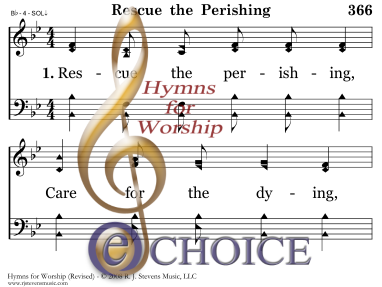
Rescue the perishing, care for the dying, It is these notes of sympathy that vibrate when a voice calls them forth from the dim memories of the past, and the music is celestial. If we never meet again on earth, we will meet up yonder.” As he said this, he raised my hand to his lips and before I had recovered from my surprise he had gone and remains to this day a nameless friend, who touched a deep chord of sympathy in my heart. The evening that you spoke at the mission I sought and found peace, and I have tried to live a consistent Christian life ever since.

You may imagine my surprise when he said, “Miss Crosby, I was the boy, who told you more than thirty-five years ago that I had wandered from my mother’s God. After the meeting a large number of men shook hands with me, and among them was a man, who seemed to be deeply moved. I told them the incident that led me to write “Rescue the Perishing,” as I have just related it.

In November, 1903, I went to Lynn, Massachusetts, to speak before the Young Men’s Christian Association. Doane, who wrote the beautiful and touching music as it now stands. The next day my words were written and forwarded to Mr. When I arrived it my home I went to work on it at once and before I retired the entire hymn was ready for a melody. Doane had sent me the subject “Rescue the Perishing,” and while I sat there that evening the line came to me, “Rescue the perishing, care for the dying.” I could think of nothing else that night. A young man of eighteen came forward and said, “Did you mean me? I have promised my mother to meet her in heaven but as I am now living that will be impossible.” We prayed for him he finally arose with a new light in his eyes and exclaimed triumphantly, “Now, I can meet mother in heaven for I have found her God.”Ī few days before, Mr.

So I requested that, if there was any boy present, who had wandered away from mother’s teaching, he would come to the platform at the conclusion of the service. The following is Fanny Crosby’s own story of how this hymn came about:Īs I was addressing a large company of working men one hot August evening, the thought kept forcing itself upon my mind that some mother’s boy must be rescued that very night or perhaps not at all.


 0 kommentar(er)
0 kommentar(er)
